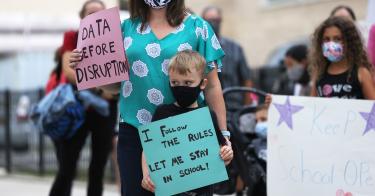In light of increasing numbers of COVID-19 cases in New York state, Gov. Andrew Cuomo has designated certain areas as “red zones.” Those living in these zones are once again subject to severe lockdown restrictions similar to those imposed in the early days of the pandemic.
Do you want in-person schooling for your children? Would you like to attend a church service with more than nine others in attendance? Well, if you’re a red-zoner, Cuomo says, “Fuhgeddaboudit!”
But religious practice is a natural right and constitutionally guaranteed freedom, and schooling of any kind is an intrinsic part of family life in America. Before placing limitations on houses of worship or schools, there should be clear and convincing proof that these places are, indeed, hotbeds of transmission.
Simply put, if governors or mayors choose to shut down or restrict these institutions, they need to show their work.
This shouldn’t be a problem for states like New York or California that have long boasted of “armies of contact tracers.” The point of contact tracing is to identify where an infected person has visited and those who may have been exposed at those locations. It should therefore be easy to identify where outbreaks occur.
We do have some data about schools in New York City. In an Oct. 4 press briefing, Mayor Bill De Blasio said, “Consistently, what we’ve found is no evidence of spread in the schools.” He further reported that, when two schools that were tested in one of New York’s “red zone” ZIP codes, the 178 tests found only one positive case.
De Blasio added that “four yeshivas … had to be closed in these zip codes,” but presented no evidence as to why closure was necessary. This could be another example of the undue government scrutiny New York City’s Jewish community has faced during the pandemic. The mayor went on to note that, across the nonpublic schools, the city health department’s intense monitoring “generally has not been yielding larger problems.”
In the absence of evidence showing that schools in these ZIP codes are causing problems, then closing them down looks a lot like the arbitrary exercise of power at the expense of every affected family.
Switching to the topic of religious practice, that’s a freedom explicitly protected by the First Amendment. Governments must actively try to loosen restrictions, unless there are compelling public health reasons to leave them in place. The burden here lies with government, not with people seeking to live according to their religious beliefs.
Churches have generally sought to comply with government restrictions, and some have not exercised their liberties to the fullest extent. For example, during a recent visit to California, I was able to receive communion—a weekly occurrence in pre-COVID times, but a rarity these days. This was because Mass was being offered outdoors to comply with the state’s restrictions.
Technically, this church could have hosted a 100-person indoor Mass because its county was recently upgraded from “widespread” to “substantial” risk, which allows slightly looser restrictions. However, worsening community numbers could trigger enhanced restrictions again. For this reason, some pastors are choosing to maintain outdoor services so that congregants have some stability in their church schedules.
This is possible in Southern California’s year-round, temperate climate. But this is not feasible in Nevada during the summer, or Minnesota in winter. The free exercise of religion should not be contingent on weather conditions. Again, if governments place heavy restrictions on houses of worship, they must show their work.
Like New York, California boasts of its own “army of coronavirus detectives.” Have they shown that churches are the nexuses for outbreaks? There are dozens of Catholic parishes and millions of parishioners in Los Angeles alone. Even so, no Catholic church has been linked to outbreaks in the country that can justify these restrictions.
It was always illogical for governments to deem schooling and worship to be “nonessential activities.” Among those things that make us human, what could be more quintessential than school, more essential than church?
What’s done is done, but as we continue to move forward through COVID-19, if governments declare they must shut down or restrict these activities, we must insist that, first, they show their work.
This piece originally appeared in Twincities.



